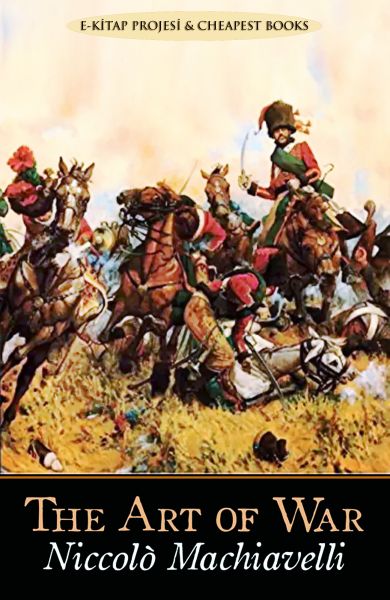The Art of War
The Art of War (Dell'arte della guerra), is one of the lesser-read works of Florentine statesman and political philosopher Niccolò Machiavelli.
The format of 'The Art of War' was in socratic dialogue. The purpose, declared by Fabrizio (Machiavelli's persona) at the outset, "To honor and reward virtù, not to have contempt for poverty, to esteem the modes and orders of military discipline, to constrain citizens to love one another, to live without factions, to esteem less the private than the public good." To these ends, Machiavelli notes in his preface, the military is like the roof of a palazzo protecting the contents.
Written between 1519 and 1520 and published the following year, it was the only historical or political work printed during Machiavelli's lifetime, though he was appointed official historian of Florence in 1520 and entrusted with minor civil duties.
Many, Lorenzo, have held and still hold the opinion, that there is nothing which has less in common with another, and that is so dissimilar, as civilian life is from the military. Whence it is often observed, if anyone designs to avail himself of an enlistment in the army, that he soon changes, not only his clothes, but also his customs, his habits, his voice, and in the presence of any civilian custom, he goes to pieces; for I do not believe that any man can dress in civilian clothes who wants to be quick and ready for any violence; nor can that man have civilian customs and habits, who judges those customs to be effeminate and those habits not conducive to his actions; nor does it seem right to him to maintain his ordinary appearance and voice who, with his beard and cursing, wants to make other men afraid: which makes such an opinion in these times to be very true. But if they should consider the ancient institutions, they would not find matter more united, more in conformity, and which, of necessity, should be like to each other as much as these (civilian and military); for in all the arts that are established in a society for the sake of the common good of men, all those institutions created to (make people) live in fear of the laws and of God would be in vain, if their defense had not been provided for and which, if well arranged, will maintain not only these, but also those that are not well established.
"Every one sees what you appear to be, few really know what you are."
"It must be remembered that there is nothing more difficult to plan, more doubtful of success, nor more dangerous to manage than a new system. For the initiator has the enmity of all who would profit by the preservation of the old institution and merely lukewarm defenders in those who gain by the new ones."
- Niccolò Machiavelli
Versandkostenfreie Lieferung! (eBook-Download)
Als Sofort-Download verfügbar
- Artikel-Nr.: SW9786056849268110164
- Artikelnummer SW9786056849268110164
-
Autor
Niccolò Machiavelli, Niccolò Machiavelli
- Wasserzeichen ja
- Verlag E-Kitap Projesi & Cheapest Books
- Seitenzahl 300
- Veröffentlichung 15.12.2023
- ISBN 9786056849268

